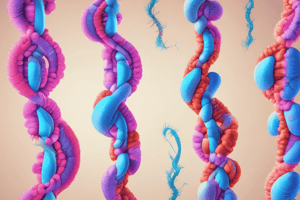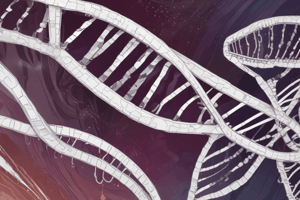Podcast
Questions and Answers
What characterizes Turner Syndrome?
What characterizes Turner Syndrome?
- Complete absence of one X chromosome in females (correct)
- Increased risk of autoimmune disorders in males
- Delayed puberty and infertility in females
- Having an extra X chromosome in males
What causes Trisomy 21 (Down Syndrome)?
What causes Trisomy 21 (Down Syndrome)?
- Having a missing X chromosome
- Having an extra Y chromosome
- Having only one copy of chromosome 21
- Having three copies of chromosome 21 (correct)
Which chromosomal abnormality is associated with premature aging symptoms?
Which chromosomal abnormality is associated with premature aging symptoms?
- Trisomy 21
- Chromosome 13q Deletion Syndrome
- Turner Syndrome (correct)
- Klinefelter Syndrome
What is the genetic makeup of individuals with Klinefelter Syndrome?
What is the genetic makeup of individuals with Klinefelter Syndrome?
Which factor contributes to the development of coronary heart disease according to the text?
Which factor contributes to the development of coronary heart disease according to the text?
'Chromosome 13q Deletion Syndrome' leads to which of the following?
'Chromosome 13q Deletion Syndrome' leads to which of the following?
What is the main cause of genetic disorders as mentioned in the text?
What is the main cause of genetic disorders as mentioned in the text?
How are genetic disorders related to protein function?
How are genetic disorders related to protein function?
Which of the following is an example of a single gene defect disorder?
Which of the following is an example of a single gene defect disorder?
How do multifactorial disorders differ from single gene defects?
How do multifactorial disorders differ from single gene defects?
In genetic disorders, what role do mutations play in the affected genes?
In genetic disorders, what role do mutations play in the affected genes?
What structure is DNA wound around to form chromosomes?
What structure is DNA wound around to form chromosomes?
Study Notes
Chromosomes: Their Structure and Function
Chromosomes play a vital role in carrying hereditary traits from generation to generation. They consist of DNA molecules wound tightly around histone proteins into a structure known as chromatin. During cell division, the coiled chromatin condenses to form chromatids, which replicate and separate during meiosis or mitosis. Although chromosomes were initially discovered by observing their movement during cell division, their functions have been studied extensively over the years, enriching our understanding of gene organization, expression control, cellular signaling pathways, and genome stability.
Now, let's delve deeper into the intricacies of chromosomal abnormalities, specifically with regards to human health and diseases like genetic disorders.
Genetic Disorders: An Overview
Genetic disorders are conditions caused primarily by mutations in genes responsible for normal growth, development, and function of the body's tissues. These mutations can alter the structure or function of proteins encoded by affected genes, leading to various disease manifestations. Some common types of genetic disorders include single gene defects, multifactorial disorders, and chromosomal aberrations.
Single Gene Defects
Single gene defects occur when there is a change or mutation in one specific gene. Examples of this type of disorder include sickle cell anemia, cystic fibrosis, and Huntington's disease.
Multifactorial Disorders
Multifactorial disorders involve multiple factors contributing to the development of the disorder, such as both genetic and environmental factors. A classic example is coronary heart disease, where both heredity and lifestyle contribute to its risk.
Chromosomal Aberrations
Chromosomal aberrations refer to changes in the number or structure of chromosomes, affecting the overall genetic makeup of an individual. These abnormalities can result from various causes, including errors occurring during meiosis and mitosis, incomplete separation of sister chromatids, or failure to separate daughter chromatids after crossing over between homologous pairs.
Common Chromosomal Abnormalities Linked to Genetic Disorders
Several chromosomal abnormalities can lead to genetic disorders due to altered gene dosage and disrupted gene expression patterns. Some of these abnormalities include:
Trisomy 21 (Down Syndrome)
Trisomy 21, more commonly known as Down syndrome, is the most common chromosomal abnormality associated with mental retardation. It results from having three copies instead of two copies of chromosome 21, causing deformities ranging from mild to severe intellectual disability.
Turner Syndrome
Turner syndrome affects females and is characterized by a complete or partial absence of one X chromosome, resulting in short stature and gonadal dysgenesis. It also often leads to premature aging symptoms and increased risk of certain medical conditions like autoimmune disorders.
Klinefelter Syndrome
Klinefelter syndrome occurs when individuals have an extra X chromosome, resulting in XXY instead of the typical XY sex chromatin pattern. This condition affects males, causing delayed puberty, infertility, and other health issues.
Chromosome 13q Deletion Syndrome
Chromosome 13q deletion syndrome involves a missing segment of chromosome 13, leading to intellectual disability, distinctive facial features, and various medical complications.
These chromosomal abnormalities illustrate how tiny variations in our genetic material can significantly impact our health and wellbeing. Understanding these conditions can help in early diagnosis, counseling parents-to-be, guiding treatment strategies, and advancing scientific research to improve the quality of life for affected individuals.
Studying That Suits You
Use AI to generate personalized quizzes and flashcards to suit your learning preferences.
Description
Test your knowledge on chromosomal abnormalities and genetic disorders, including conditions like Down syndrome, Turner syndrome, and Klinefelter syndrome. Explore the structure and function of chromosomes, how genetic disorders arise, and the impact of chromosomal aberrations on human health.



